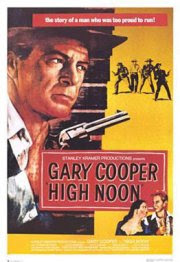
The clocks are ticking down, as the action of the 1952 western High Noon
Ranked 33 on the Original American Film Institute's Top 100 list, and moved up to 27 on their revised 10th anniversary edition, it is clear that the western High Noon is no ordinary movie. In point of fact, it is a very different kind of western. Extensialistic, the film concentrates more on moral questions rather than the type of action so common in cowboy films. Foremost among the themes explored though, is the classic western dichotomy of the need for violence to create civilization, but how in order to be civilized there can be no violence. It also makes strong statements of what it means to be a man as opposed to a boy, the idea of the greater good, and, briefly, touches on women's place in both western society and in the lives of men (though, admittedly, it does still regal women largely to the damsels in distress or as lovers-only roles). I won't go any further except to say, that though the film tackles deep questions, the secondary characters' portrayals are strong enough and multi-dimensional enough to allow them to take the burdens of conveying such themes.
The film's strengths shine through, allowing it to have overcome the controversy present in both it's making and debut, so that it was able to go on, not only to win multiple Academy Awards, but to also become a classic, and politically and artistically relevant film today.
As with much of Hollywood in the early nineteen fifties, this film did not escape the McCarthy witch-hunts unscathed. Screenwriter and uncredited co-producer, Carl Foreman, was labeled as an "unfriendly witness" for refusing to name names from his time some years earlier as part of the Communist party. This nearly got him kicked off of the making of the production, except for the fact that several people including Cooper (who ironcially was a "friendly witness" some years later, though he too did not name names) stepped in on his behalf. The film itself was often taken (correctly it seems from later interviews with Foreman) as an allegory for the lack of action against the Red Scare, leading John Wayne to disparage the film as "the most un-American film" he'd ever seen (however, it should be noted that Wayne did still accept Cooper's award for his role on his behalf, since Cooper had been unable to attend the Academy Awards). Ironically, the USSR blasted the film as "glorification of the individual." Even beyond all the politics involved, many moviegoers and critics also complained about the lack of traditional western plotlines and archetypes.

But the film has withstood the test of time, and in later years was recognized as a great film that was a proponent of strong moralistic values and a code of honor. Both of these were exemplified in Cooper's role, Will Kane. In fact, it became a favorite film of two former presidents, Regean and Clinton, and holds the record for the most screenings of any film at the White House (with 17 viewings). US leaders were not the only ones who came to feel High Noon presented positive political views though. In 1989, the film became an important symbol for Poland's first semi-free election, when posters featuring Cooper's character Kane holding a voting ballot, appeared with the slogan "High Noon: 4 June 1989" which was the date of the actual election.
The awards and cultural impact of the film speak for themselves, so I will just end saying, that a viewing of High Noon is a must for eveyr movie lover. So be there when the train rolls in.

I love that you combine film and fashion. Great blog, want to follow each other?
Reply DeleteWWW.ROXTHEFOX.COM
Reply Deletelove your blog :)
following u now via GFC, hope yo do the same..kisses
Hey. You have a nice blog. I wanted to ask if you like to follow my blog &’ll follow yours. My blog will talk about beautytests.
Reply Deletehttp://beauty2test.blogspot.com
This is an amazing movie! Grace Kelly is beautiful as always, and the story is thought provoking.
Reply DeleteWith her blonde hair and look of innocence Grace Kelly in this really does seem to personify the peaceful way of life over violence, doesn't she?
Deletei actually have hardly watched any old movies, but i've been wanting to for so long. perhaps i'll start with this one :) thank you for the review and the inspiration to finally start!
Reply Deletehow have you been, dear? i hope all is well.
xox, amber
It's funny about classic films, isn't it? There are so many films, and other forms of entertainment, that one must almost be rather deliberate in choosing to watch classic films, huh? Glad you are thinking of starting to watch more. You'l like High Noon if you like westerns.
DeleteI'm well; how are you?